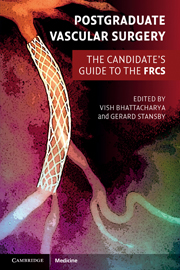Book contents
- Frontmatter
- Contents
- List of contributors
- Preface
- Section 1 Final FRCS vascular clinicals
- Section 2 Final FRCS vascular topics
- 1 Vascular risk factors and their management
- 2 Management of acute limb ischaemia
- 3 Chronic lower limb ischaemia, critical ischaemia and the diabetic foot
- 4 Endovascular and surgical options for peripheral revascularisation
- 5 Abdominal aortic aneurysms
- 6 Thoracic, thoracoabdominal and suprarenal aortic aneurysms
- 7 Aortic dissection
- 8 Popliteal artery aneurysms
- 9 Femoral artery aneurysms
- 10 Carotid, subclavian and vertebral disease
- 11 Diagnosis and management of thoracic outlet syndrome
- 12 Diagnosis and management of hyperhidrosis
- 13 Chronic mesenteric ischaemia
- 14 Acute ischaemic colitis
- 15 Vascular trauma
- 16 Indications and management of lower limb amputation
- 17 Leg swelling and lymphoedema
- 18 Varicose veins and chronic venous insufficiency
- 19 Management of deep vein thrombosis
- 20 Infection in vascular surgery
- 21 Vascular malformations
- 22 Vasospastic disorders and vasculitis
- 23 Critical care considerations and preoperative assessment for general and vascular surgery
- 24 Access surgery
- 25 Basic outline of solid organ transplantation
- Index
- References
23 - Critical care considerations and preoperative assessment for general and vascular surgery
- Frontmatter
- Contents
- List of contributors
- Preface
- Section 1 Final FRCS vascular clinicals
- Section 2 Final FRCS vascular topics
- 1 Vascular risk factors and their management
- 2 Management of acute limb ischaemia
- 3 Chronic lower limb ischaemia, critical ischaemia and the diabetic foot
- 4 Endovascular and surgical options for peripheral revascularisation
- 5 Abdominal aortic aneurysms
- 6 Thoracic, thoracoabdominal and suprarenal aortic aneurysms
- 7 Aortic dissection
- 8 Popliteal artery aneurysms
- 9 Femoral artery aneurysms
- 10 Carotid, subclavian and vertebral disease
- 11 Diagnosis and management of thoracic outlet syndrome
- 12 Diagnosis and management of hyperhidrosis
- 13 Chronic mesenteric ischaemia
- 14 Acute ischaemic colitis
- 15 Vascular trauma
- 16 Indications and management of lower limb amputation
- 17 Leg swelling and lymphoedema
- 18 Varicose veins and chronic venous insufficiency
- 19 Management of deep vein thrombosis
- 20 Infection in vascular surgery
- 21 Vascular malformations
- 22 Vasospastic disorders and vasculitis
- 23 Critical care considerations and preoperative assessment for general and vascular surgery
- 24 Access surgery
- 25 Basic outline of solid organ transplantation
- Index
- References
Summary
Key points
Perioperative cardiac complications are the most serious risk to delineate and pre-emptively manage
Discussions between anaesthetist, surgeon and cardiologist are frequently required on a case-by-case basis
Critical care is an essential and rapidly developing support to many surgical procedures
Introduction
‘Good surgeons know how to operate, better surgeons know when to operate, and the best surgeons know when not to operate.’ This aphorism reflects the intertwined nature of surgery, anaesthesia and critical care. Poor patient selection or preparation for a particular surgical procedure cannot be entirely compensated for by good anaesthesia or critical care. The purposes of preoperative assessment include the identification and management of individual patient risks as well as appropriate resource allocation.
Sixty per cent of patients undergoing major vascular surgery have significant coronary artery disease (CAD). Similarly, CAD is common among patients having non-vascular procedures, so an understanding of the important principles of investigation and management is important for all surgeons and anaesthetists. This section will therefore concentrate particularly on cardiovascular assessment, although other disease states are also considered.
Preoperative assessment
General preoperative assessment
When considering an individual patient, the degree of CAD is often difficult to adequately assess by history and examination alone (e.g. because of limitations in exercise capacity due to claudication, general fatigue or the time limited nature of an emergency presentation). However, a good history and examination can allow specific directed investigations to be carried out.
- Type
- Chapter
- Information
- Postgraduate Vascular SurgeryThe Candidate's Guide to the FRCS, pp. 272 - 287Publisher: Cambridge University PressPrint publication year: 2011



